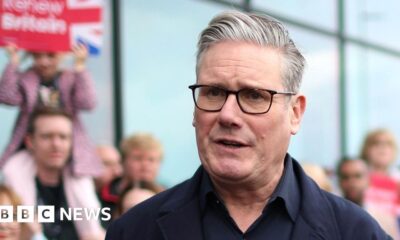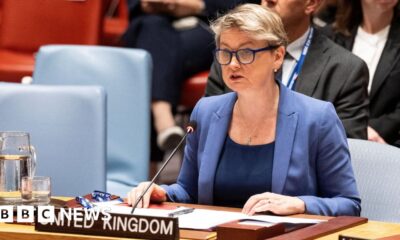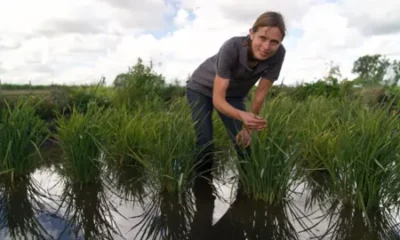Business
From drug theft to Dubai arrests: How a Scottish gangland feud went global
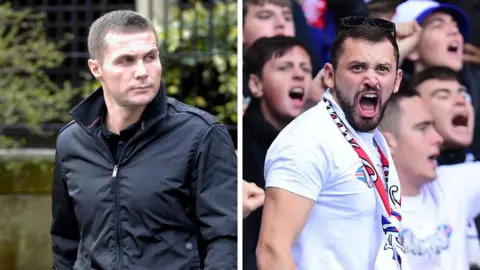
Read full article on post.
Paul O’HareBBC Scotland News
The arrests of four major Scottish crime figures in Dubai remain shrouded in mystery more than 10 days after they were taken into custody.
Steven Lyons, Ross McGill, Stephen Jamieson and Steven Larwood have been held in the United Arab Emirates since 16 September.
Police Scotland believe all four are linked to criminality, ranging from drug importation to a fresh wave of gangland violence across the central belt.
The Gulf raids are the latest development in a bloody feud between the Lyons and the Daniel families which has raged for 25 years.
Both gangs are now on their second generation of leaders.
The Lyons crime group is currently headed by Steven Lyons, one of the Dubai four.
It rose to prominence under the leadership of his father Eddie, of Cumbernauld, North Lanarkshire.
Jamie Daniel – who became a millionaire after starting out as a scrap metal dealer in Glasgow’s Possil – founded and led the crime clan bearing his name.
When he died from cancer in July 2016 there was no obvious successor but the power vacuum he left behind was eventually filled by his nephew, Steven “Bonzo” Daniel.
The bitter rivalry between the two families is said to date back to the theft of a £20,000 stash of cocaine from a Daniel safe house in the north of Glasgow in 2001.
But in December 2006 it became headline news when Michael Lyons, 21, was shot dead after two masked gunmen walked into his uncle’s MoT garage.
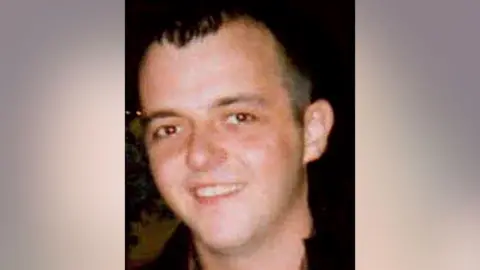 Police Scotland
Police ScotlandSteven Lyons and an associate, Robert Pickett, were injured in the ambush, which was later described in court as “like a scene out of The Godfather”.
In May 2008, Daniel gang members Raymond Anderson and James McDonald were convicted of the attack and each sentenced to 35 years in jail, which was later reduced on appeal.
A series of tit-for-tat attacks followed, ranging from shootings to kidnappings, but it would be January 2010 before the feud claimed a second victim.
Daniel clan enforcer Kevin “Gerbil” Carroll had arranged to meet drug dealer Stephen Glen outside an Asda store in Glasgow’s Robroyston.
Glen later recalled being told: “You’re working for me now, anybody that doesn’t fall in line is going to get banged.”
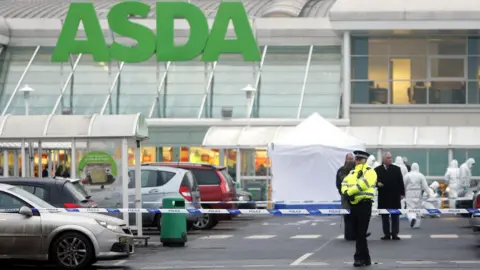 PA Media
PA MediaMinutes later Carroll, 29, was sitting in the back seat of an Audi A3 in the car park when a Volkswagen Golf screeched to a halt.
As lunchtime shoppers looked on, two gunmen got out and shot Carroll 13 times.
I was the Daily Record’s crime reporter at the time and was sent to a retail park frozen in time. As darkness fell, the first vehicles were eventually allowed to leave the massive police cordon.
But, understandably, no-one stopped to speak about the most public gangland hit ever carried out in Scotland.
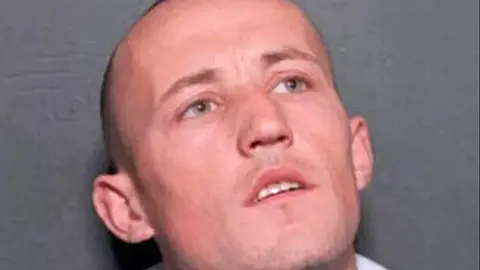 Police Scotland
Police ScotlandCarroll’s significance was later highlighted in court when it emerged detectives investigating the shooting had compiled a list of 99 potential suspects.
In May 2015, William “Buff” Paterson, who fled to Spain after the killing, was convicted of murder and told he must serve a minimum of 22 years in jail.
Judge Lord Armstrong told him: “It was not a spontaneous event which happened on the spur of the moment, it was in effect an execution.”
Jamie Daniel’s death, at the age of 58, was the catalyst for the third significant chapter in the story.
It sparked a savage campaign of violence against his associates.
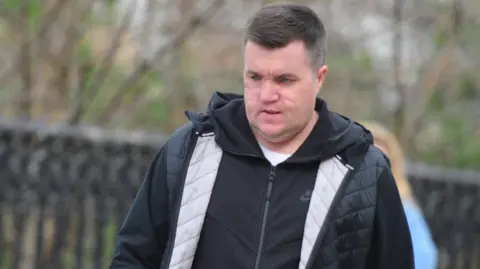 Spindrift
SpindriftThe victims included his successor, Steven “Bonzo” Daniel, who was left with horrific facial injuries after a high-speed car chase through Glasgow in May 2017.
A court later heard a graphic account of how he was attacked with bladed weapons after he crashed his Skoda Octavia – which had been fitted with a tracking device – and passed out behind the wheel.
Two years later, six associates of the Lyons family were jailed after being found guilty of five murder plots.
Lord Mulholland told them: “You sought to turn Glasgow into a war zone for your feud.”
The Dubai arrests also have a link to the case of Jamie “Iceman” Stevenson, who was jailed last year for masterminding a £100m plot to smuggle cocaine from South America in boxes of bananas.
During his trial, he lodged a special defence of incrimination against three men including Stephen Jamieson, one of the four major gangland figures now believed to be in custody in the UAE.
The High Court in Glasgow heard that Jamieson’s present whereabouts were “unknown”.
Last December, the Lyons/Daniel feud was introduced to a wider UK audience as the focus of a six-part BBC Gangster podcast.
At that time, much of the content was historical – but by the summer the producers had reason to commission a new episode.
Until recently, Ross McGill was best known to police as the former head of Rangers Football Club’s ultras fan group, the Union Bears. But after a gangland feud erupted in Edinburgh in March, his name began to appear in the tabloids.
Reports suggested McGill, who once co-ordinated chants on the Ibrox terraces, was now orchestrating the wave of violence across the central belt from his new home in Dubai.
The trigger was a falling out between McGill and Edinburgh-based Mark Richardson – who has connections to the Daniel crime group – over a drug deal said to involve fake bank notes.
McGill’s relative anonymity contrasted with Richardson, who was jailed in 2018 for his role in what detectives described as Scotland’s most sophisticated crime gang.
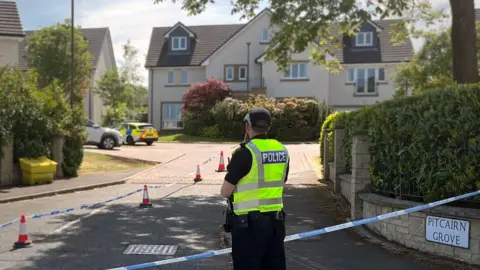
In April, the attacks spread from the capital to Glasgow and the violence escalated from deliberate fires to terrifying assaults.
A profile of the victims also began to emerge.
They included individuals linked to the Daniel family, which naturally led detectives to suspect the Lyons clan had a significant hand in events.
In one incident, a 72-year-old woman and a 12-year-old boy were attacked at a house in Milton in the north of Glasgow.
A 54-year-old man was also seriously injured outside his home in Edinburgh.
As the number of incidents spiralled, videos and threats were posted on social media under the banner of Tamo Junta.
The gang is reportedly led by McGill, who goes by the nickname Miami.
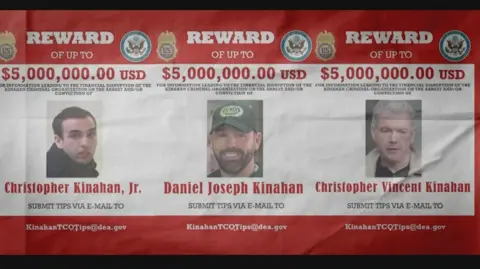 US Treasury
US TreasuryThis tactic is believed by law enforcement sources to have created tensions with Steven Lyons, who had been content to keep a low profile in Dubai.
Lyons had settled there after initially leaving Scotland for Spain, soon after being injured in the 2006 garage shooting.
But in the space of a few weeks the attacks put some of the country’s leading underworld figures and their associates back under the police spotlight.
Steven Lyons’ criminal alliances include ties to the Dubai-based Kinahan crime group.
He is understood to have forged a relationship with founder Christy’s son, former boxing promoter Daniel Kinahan, while living in the Costa del Sol.
Stephen Dempster, producer of Kinahan: The True Story of Ireland’s Mafia, told BBC Scotland’s Scotcast that by the mid-2010s the Lyons group had become bigger and wealthier by tapping into the cartel’s global network.
The BBC journalist also said the UAE was an attractive destination for major criminals.
“There is a level of freedom in Dubai. You can spend your money. There is property to be bought,” he said. “It’s also a place with light touch financial regulation.”
For the most part, Steven Lyons’ business was largely conducted in the shadows – but one night in Spain changed everything.
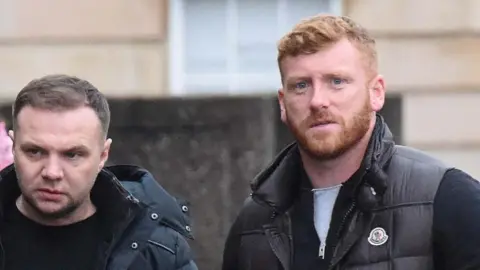 Spindrift
SpindriftOn 31 May, a lone gunman walked into a beachfront bar in Fuengirola and shot his brother, Eddie Lyons Jnr. The suspect then pursued Eddie’s friend, Ross Monaghan, inside and opened fire.
Both men were pronounced dead at the scene.
As the news of their deaths reached Scotland the following morning, there was a genuine sense of shock at the murders.
Eddie Jnr, 46, and Monaghan, 43, were major players in the Lyons crime group. The pair, who were cremated following a double funeral, had both survived previous attempts on their lives.
Eddie was shot and wounded in a 2006 attack which was believed to have been carried out by Kevin “Gerbil” Carroll.
Monaghan stood trial for Carroll’s murder before the case against him collapsed in 2012. Five years later, he was shot outside a Glasgow primary school.
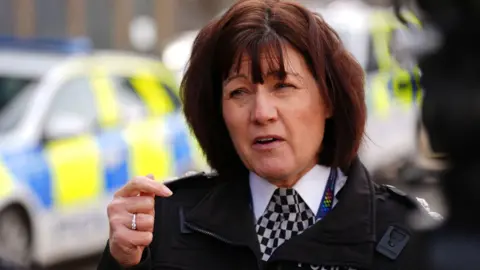 PA Media
PA MediaThere was a natural suspicion that the murders were linked to the violence which had played out in Scotland over the previous two months.
But on 3 June, Police Scotland said there was currently nothing to suggest the shootings were related to the ongoing gang war, which it is investigating under Operation Portaledge.
This chimed with the observations of some law enforcement sources who said the double hit marked a significant escalation from events in Edinburgh and Glasgow.
In an unexpected twist, a Spanish detective later told reporters that a Liverpool man, arrested in connection with the murders, was a member of the rival Daniel gang.
Police Scotland responded by maintaining its original position – that it wasn’t aware of any evidence the shootings were linked to the feud, or had been planned from Scotland.
Later in the month, Chief Constable Jo Farrell said detectives were building intelligence to target the leaders of the groups involved.
Her message to anyone directing violence in Scotland from a foreign country was: “We’ll be coming after you.”
Asked what could be done if someone was based in Dubai, Farrell said officers were working closely with the Crown Office and the National Crime Agency “to see if we can get those people back from those countries”.
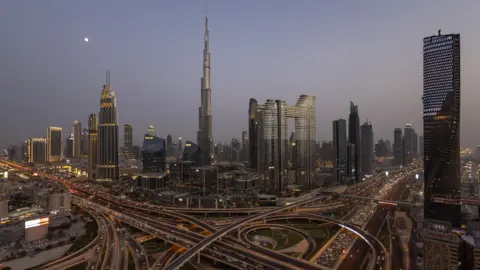 Bloomberg via Getty Images
Bloomberg via Getty ImagesIn the weeks that followed, officers made further arrests under Operation Portaledge – taking the total to 57 – but there was a sense that the momentum was slowing.
And then came the swoop in Dubai, which caught the force by surprise.
BBC Scotland News understands the four men were targeted in connection with alleged offences in the United Arab Emirates (UAE).
But to date there has been no official confirmation from the Gulf about the arrests, let alone why they were made.
A week on, all Dubai Police would say, via email, was: “We cannot share this information due to confidentiality.”
Given the information vacuum, what happens next is unclear.
But the recent extradition to Ireland of gangland murder suspect Sean McGovern raises the prospect that Lyons, McGill, Jamieson and Larwood could return to Scotland.
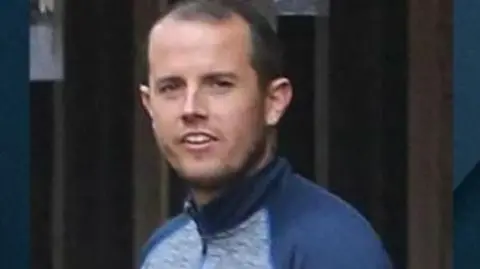 Interpol
InterpolRadha Stirling, founder of Detained in Dubai, said the UAE had recently been co-operating with extradition requests and arresting wanted people more frequently than it had in the past.
“While the UK will almost certainly push for extradition, it remains to be seen whether such a request will be granted,” she said.
The London-based human rights lawyer said the UK had historically declined extraditions to the Emirates due to the risk of human rights violations, unfair trials, discrimination and torture.
“It would be disheartening if the removal of alleged fugitives to Britain put ordinary citizens at increased risk of being sent the other way,” she added.
BBC Scotland News tried several avenues to obtain information about the arrests.
We received no response from the Dubai government, the UK embassy in Dubai, or the UAE embassy in London.
A spokesman for the Foreign, Commonwealth & Development Office would only say that it was in contact with the family of one British man in the UAE and the local authorities.
Many unanswered questions remain and what happens next is anyone’s guess.
But the fate of the Dubai four will be watched with interest by Gulf-based organised criminals who, until last week, believed they were untouchable.
Business
‘You’d have to have been a turkey not to have made money in venture capital in 1997’
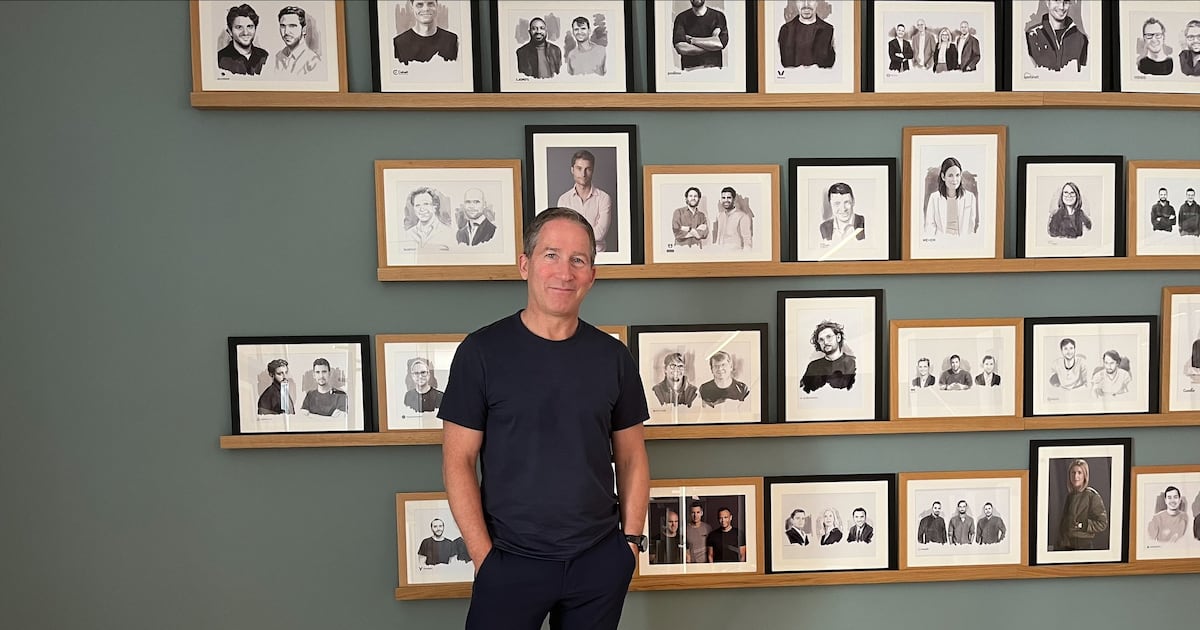
Read more on post.
Faced with deciding what to do when he left school, Fergal Mullen made the snap decision to study electronic engineering. It seemed like a good idea at the time but in fact Mullen’s calling lay elsewhere as he quickly discovered when an athletics scholarship saw him transfer from what was then Dublin Institute of Technology (DIT) – now TU Dublin – to Brown University in Providence, Rhode Island, where he combined engineering with business studies and a passion for distance running.
“Going to Brown was my ‘get lucky moment’. The curriculum was liberal arts based and as I was a bit bored with all the engineering stuff I started exploring subjects within the business studies curriculum such as economics and organisational behaviour and absolutely loved it,” says Mullen, who credits Irish Olympian athlete John Treacy for encouraging him to move Stateside and helping him get enrolled at Brown.
“I met John at a race – he won, I came second – and we hit it off immediately and are still friends,” says Mullen. “John took me to meet the coach at Brown, reeled off my times and left. I started there in September 1986.”
Going to live in the US wasn’t a big upheaval for Mullen as he had been there before on a J1 working as a golf caddie by day and gigging at night, playing Irish traditional music.
“Studying at Brown opened so many doors for me, and somewhere along the line I came across private equity and venture capital. I didn’t jump into this field immediately but it’s where I have spent the last 26 years of my career,” says Mullen.
From Brown, Mullen joined US-based consulting firm Cambridge Technology Partners and spent 11 years there, rising to the rank of senior vice-president sales for the company in Europe. “I got large exposure to business in Cambridge at a very young age,” says Mullen. “We went public in 1993 and I wrote the IPO prospectus.
“We took the business from zero to $700 billion in revenues with 56 offices around the world. This equipped me with a broad set of business skills and experience in scaling, which I was then able to bring to my career in venture capital.”
In 2012, Mullen – who has an MBA from Harvard and is a former board member of the Michael Smurfit Graduate Business School in Dublin – cofounded the technology-focused investment firm Highland Europe, which employs 35 people and has offices in Geneva and London.
Highland invests in growth stage, product-led companies predominantly in software and consumer-facing internet businesses. Its sweet spot is companies turning over €10 million who are looking to raise €20-€80 million to accelerate their expansion.
“We have 70-plus companies in our portfolio with over €3 billion in assets under management,” says Mullen, who adds that Highland fishes in a competitive pool against some of the biggest names in international investment, including those from Silicon Valley.
The companies Highland invests in tend to be at the leading edge of their sectors and, to date, Highland has invested in and exited 29 ventures in areas such as mobile marketing, fraud prevention, software for waste and recycling, workplace scheduling software and online loan comparison.
The company is a former investor in Limerick-based AMCS, which was sold last year, and more recently Highland has become an investor in 9 Fin, a Belfast-based debt market intelligence company.
“I’ve been hit by the luck truck more than once in my life,” says Mullen. “My first break was going to Brown and then to Cambridge, where the challenges and level of seniority entrusted to me were significant. I launched my first corporate fund there. It was $30 million, and we got a return of 10 times. That’s pretty extraordinary but I should point out that 1997 was the best year ever in the history of venture capital. You’d have to have been a turkey not to have made money at that time.
“At Highland Europe, we are 10 equal partners in the business and invest all over Europe. Each partner in the firm has five or six boards they sit on related to investments they’ve made, and we are about to raise our sixth fund, which will be €1 billion plus.
“Our investment decisions are based on consensus. We’re a ridiculously collaborative organisation with no fiefdoms, no office politics and no bullshit. We’re all completely equal and, if at any point I’m not delivering, my partners are perfectly entitled to ask me to move on.
“As investors, our hallmark is to back companies we believe can grow and scale a business. We’re not the kind of people who will come in and break up a team. We get behind them and support them to grow and achieve their full potential.”
Mullen lives about four kilometres from Geneva, “in a lovely quiet area with the lake and the mountains to enjoy. I divide my time between travelling, the office in Geneva and our office in London, where I spend three days every other week.”
Mullen still runs to keep fit and is quietly modest about the fact that he’s one of an elite group of athletes who have run seven marathons in seven consecutive days on seven continents. His efforts raised more than €1 million for a children’s cancer charity.
Apart from running, he relaxes by skiing and golfing and he also volunteers with Human Rights Watch in Geneva, where he is chairman of the Swiss branch.
Business
We can pull this round, Starmer says ahead of Labour conference
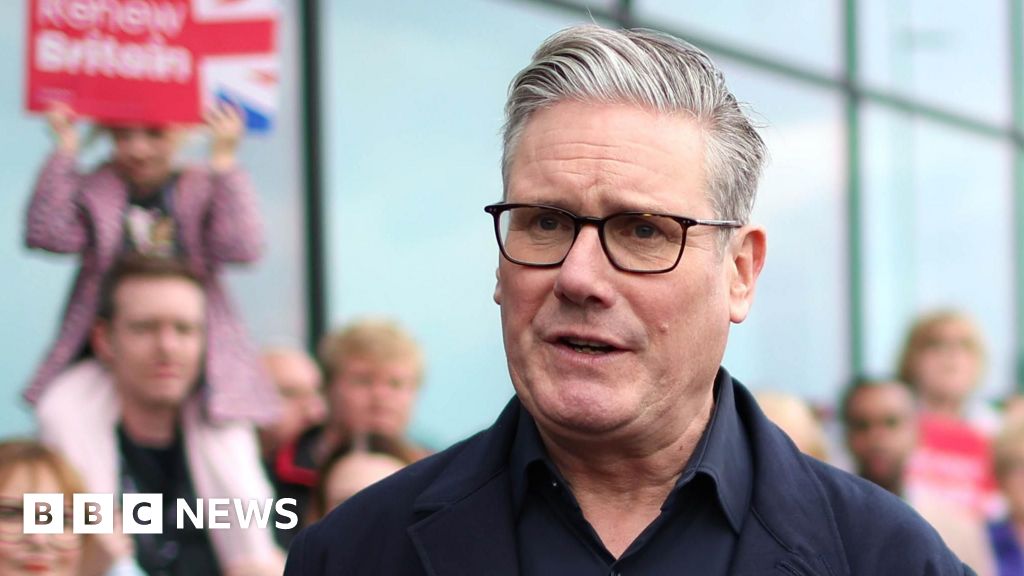
Read more on post.
Sir Keir Starmer has said he believes his government can still “pull this round” as the Labour Party heads into its annual conference hoping to revive public support.
With opinion polls suggesting Labour trails Reform UK, and mounting speculation that Greater Manchester mayor Andy Burnham could launch a leadership challenge, the prime minister told the Times it was time to “roll up our sleeves and get on with it”.
He also renewed his attacks on Nigel Farage, saying his party would “tear this country apart”.
Sir Keir told the paper that this week’s conference in Liverpool would be an opportunity for Labour to present an alternative to “toxic divide and decline”.
His comments mark the latest in a recent string of fierce criticisms of Farage, which the Reform leader has hit back at.
Farage told the Telegraph that Sir Keir’s language “smacks, frankly, of total desperation” after the prime minister referred to Reform as an “enemy” in an interview with the Guardian.
“To call somebody in politics an enemy is language that is bordering on the inciteful,” he added.
Sir Keir continued the attacks as the conference got under way, describing Farage as “grubby” in an interview with the Sunday Mirror, adding that the Reform leader was “unpatriotic” for “pretending” he would fix problems that mattered to voters.
“Add to that that he spends more time grubbing around in America, trying to make money for himself than he does representing his constituents,” the prime minister said.
“He goes there not just to make money, but to talk our country down. The leader of a political party going to another country to talk his own country down. Grubby.”
Comparisons with Reform could be a theme of this conference, as Sir Keir tries to portray his party as a patriotic alternative to Reform, who continue to lead opinion polls.
Last week, Reform announced it will replace ILR with visas and force migrants to reapply every five years, if the party wins the next election. That includes hundreds of thousands of migrants currently in the UK.
Applicants would also have to meet certain criteria, including a higher salary threshold and standard of English. ILR is a key route to gaining British citizenship and allows people to claim benefits.
According to a YouGov poll published on Saturday, abolishing indefinite leave to remain divides the public, with 58% of Britons opposed to removing it from those who already hold it.
But more than 44% say they support ending ILR as a policy, while 43% are opposed to the idea.
During a visit to the office of newspaper Liverpool Echo, Sir Keir said: “These are people who have been in our country a long time, are contributing to our society, maybe working in, I don’t know, hospitals, schools, running businesses – our neighbours, and Reform says it wants to deport them in certain circumstances.
“I think it is a real sign of just how divisive they are and that their politics and their policies will tear this country apart.”
In an interview with the Sun on Sunday, Home Secretary Shabana Mahmood said legal migration was a “good thing” and the UK had “always welcomed people who want to come and work here”.
However, she said migrants should make a “contribution to their wider community”.
“So I am looking at how to make sure that settlement in our country – long term settlement, Indefinite Leave to Remain – is linked not just to the job you are doing, the salary you get, the taxes you pay, [but] also the wider contribution you are making to our communities,” she added.
Speaking to teenagers at the Liverpool Echo visit, Sir Keir also insisted the government would not legalise cannabis, and defended his plans to lower the voting age to 16 in general elections.
“It already happens in Scotland, already happens in Wales, and the sky didn’t fall in,” he said.
Ahead of the Labour conference, backbench MPs and unions renewed calls to end the two-child benefit cap.
Several MPs from Liverpool were among those who wrote to Sir Keir ahead of the conference insisting the cap “is one of the most significant drivers of child poverty in Britain today”.
Two MPs – former shadow chancellor John McDonnell and Apsana Begum – have had the whip restored, after a year-long ban for voting against the government on the cap.
McDonnell told the BBC: “If this is a signal the government is going to scrap the two-child limit I’m really pleased.”
The prime minister’s plans for a new digital ID system, revealed on Friday, will also likely face scrutiny at the conference.
Senior Labour figures are meanwhile expected to set out the details of a fresh tranche of “New Towns” at the event.
Business
Florence Welch says she had life-saving surgery after ectopic pregnancy

Read full article on post.
Singer Florence Welch has revealed she underwent life-saving emergency surgery after experiencing an ectopic pregnancy in August 2023.
The Grammy nominee told the Guardian she was unknowingly suffering serious internal bleeding while performing on stage at a festival, telling the paper her pregnancy was “the closest I came to death”.
She was diagnosed with a ruptured fallopian tube after suffering a miscarriage, which required surgery “within the hour”.
At the time, Welch, 39, cancelled some planned concerts, telling fans she was doing so for “reasons I don’t really feel strong enough to go into yet”.
She told the Guardian she was left devastated after experiencing a miscarriage but was advised by a doctor that she would be able to honour her performance schedule.
On the day of a headline show in Cornwall, Welch said she felt unwell but was able to complete her set as planned.
However, the singer said a scan shortly after revealed there was “a Coke can’s worth of blood in my abdomen”.
She was told she would need to immediately undergo emergency surgery to have her fallopian tube removed.
According to the NHS, one in 90 pregnancies in the UK are ectopic, and occur when a fertilised egg implants itself outside of the womb.
Symptoms for women usually start between four and 12 weeks, and can include pain low down on one side of the abdomen and pain in the tip of the shoulder.
If undiagnosed, the fallopian tube can burst, leading to life-threatening internal bleeding. In those circumstances, immediate surgery to either repair or remove the organ is required.
Welch, who performs with Florence and the Machine, is due to release a new album, Everybody Scream, in October.
-
Politics5 days ago
European Parliament snubs Orbán with vote to shield Italian MEP from Hungarian arrest
-
Culture2 months ago
Fatal, flashy and indecent – the movies of Adrian Lyne revisited
-
Culture3 weeks ago
Life, loss, fame & family – the IFI Documentary Festival in focus
-
Environment1 week ago
Key oceans treaty crosses threshold to come into force
-
Culture5 days ago
Twilight at 20: the many afterlives of Stephenie Meyer’s vampires
-
Health6 days ago
EU renews support for WHO’s Universal Health Coverage Partnership
-
Culture2 weeks ago
Farewell, Sundance – how Robert Redford changed cinema forever
-
Culture4 weeks ago
What is KPop Demon Hunters, and why is everyone talking about it?



